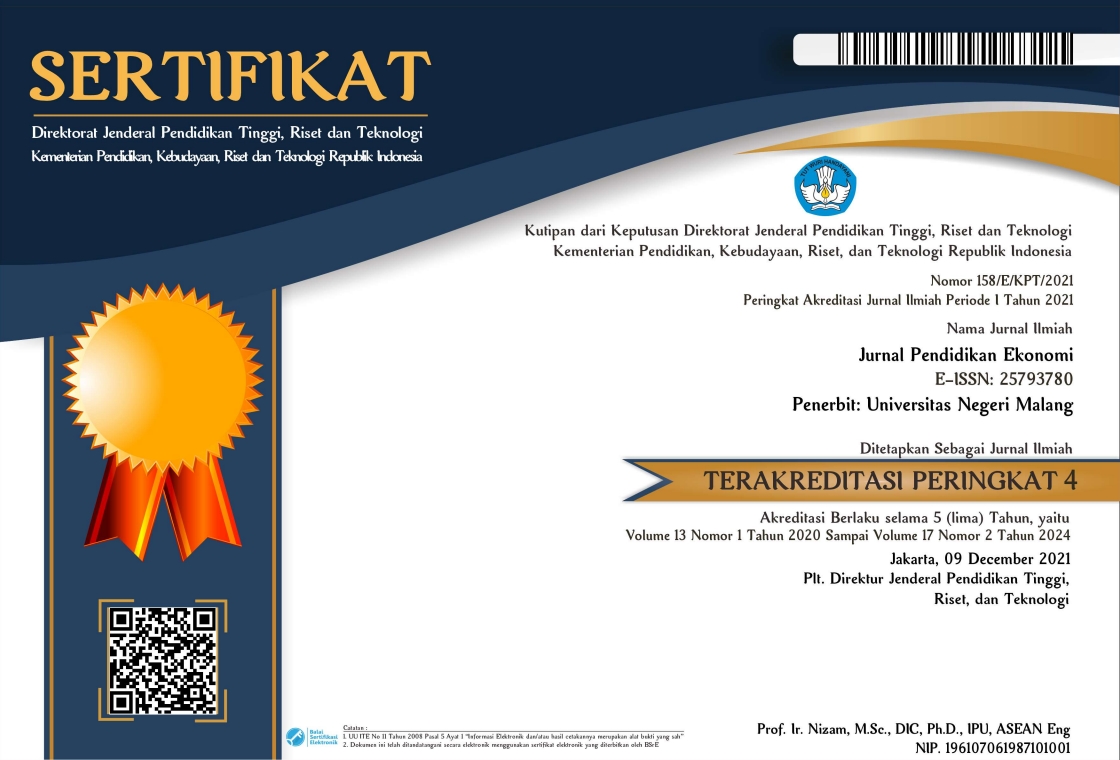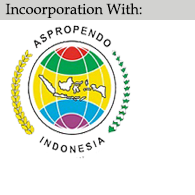Relation Between Education and Entrepreneurship
Abstract
Misinterpretation of the meaning of education and entrepreneurship has often occurred over the past few years, especially in academia. The practice has implications for the rampant cases of failure in the analysis process, which have an impact on the error of research results that develop in the community. Worse, cases of educational status that affect the profession obtained, cases of incompetent graduates, and cases of crime that increase due to unemployment also add to the existing problems, so that it demands a study of the relationship between the two is urgent to be carried out. This article restores the essence and describes the relationship between education and entrepreneurship simultaneously. This research used a type of literature study with a qualitative approach. The results of this study obtained three important points. First, the construction to describe the meaning that gives understanding and forms the correct paradigm. Second, analyze development patterns with three perspectives (psychological, functional, and situational) to give a clear direction of application to these two scientific disciplines. Third, the relationship between education and entrepreneurship forms relationships that fill each other’s space so that their roles are integrated in one unity.
Keywords
Full Text:
PDFReferences
Ahn, K., & Winters, J. V. (2023). Does education enhance entrepreneurship? Small Business Economics, 61(2), 717–743. https://doi.org/10.1007/s11187-022-00701-x
Aini, N. L., Putra, N., & Mun’im, M. A. (2023). Konstruksi sosial dan politik dalam perkembangan Pendidikan Islam. Indo-MathEdu Intellectuals Journal, 4(3), Article 3. https://doi.org/10.54373/imeij.v4i3.357
Akhmad, K. A. (2021). Peran pendidikan kewirausahaan untuk mengatasi kemiskinan. Jurnal Ekonomi, Sosial & Humaniora, 2(06), 173–181.
Amini Sedeh, A., Pezeshkan, A., & Caiazza, R. (2022). Innovative entrepreneurship in emerging and developing economies: The effects of entrepreneurial competencies and institutional voids. The Journal of Technology Transfer, 47(4), 1198–1223. https://doi.org/10.1007/s10961-021-09874-1
Amir Hamzah, M. (2020). Metode penelitian kepustakaan (library research). Malang: CV. Literasi Nusantara Abadi.
Arif, D. B. (2020). Reorientasi pendidikan kebangsaan berbasis adab: konsep dan problematiknya. PKn Progresif: Jurnal Pemikiran dan Penelitian Kewarganegaraan, 15(1), 14–38.
Asna, N., Alfiana, N., & Asiyah, B. N. (2023). Urgensi edupreneurship sebagai upaya dalam mempersiapkan Indonesian golden era. Jurnal Pendidikan Tambusai, 7(1), 4019–4025.
Asyari, S., & Qadry, I. K. (2022). Pengantar kewirausahaan (entrepreneurship) untuk mahasiswa. Jurnal Abdimas Indonesia, 2(3), 391–403.
Athar, G. A., Bantali, A., Caniago, A. S., & Olivia, H. (2023). Pelatihan dan pendampingan untuk meningkatkan minat wirausaha mahasiswa. JPM: Jurnal Pengabdian Masyarakat, 4(1), Article 1. https://doi.org/10.47065/jpm.v4i1.1007
Baum, J. R., Frese, M., & Baron, R. A. (2014). The Psychology of Entrepreneurship. Psychology Press.
Bhaskarabhatla, A. A. (2021). The relationship between education and entrepreneurship. Retrieved December 29, 2023, from https://thesis.eur.nl/pub/59948/Thesis.pdf
Ciputra. (2009). Ciputra Quantum Leap. Elex Media Komputindo.
Costa, S., Tegtmeier, S., Santos, S. C., & Schenkel, M. T. (2024). Special issue guest editorial: The challenges of experimental designs in entrepreneurship education research - An interview with Thomas D. Cook. Entrepreneurship Education and Pedagogy, 7(1), 3–21. https://doi.org/10.1177/25151274231207726
Dahlan, M. D. (1987). Dasar-dasar konseptual penanganan masalah-masalah bimbingan dan konseling Islami di bidang pendidikan. Yogyakarta: UII Press.
Damayanti, S. D., & Effane, A. (2022). Fungsi kewirausahaan dalam pendidikan. Karimah Tauhid, 1(1), 1. https://doi.org/10.30997/karimahtauhid.v1i1.7711
Daradjat dan dkk, Z. (2008). Ilmu Pendidikan Islam. Bumi Aksara.
Darmawan, D., Fuady, A. H. R., Mardikaningsih, R., & Retnowati, E. (2022). Tiga pilar sukses: perilaku kewirausahaan, etika bisnis, dan modal sosial untuk meningkatkan kinerja bisnis. TIN: Terapan Informatika Nusantara, 3(5), Article 5. https://doi.org/10.47065/tin.v3i5.4112
de Pablo Valenciano, J., Uribe-Toril, J., & Ruiz-Real, J. L. (2019). Entrepreneurship and education in the 21st century: Analysis and trends in research. Journal of Entrepreneurship Education, 22(4), 1–20.
Depdiknas. (2003). Undang-Undang RI No. 20 Tahun 2003 tentang sistem pendidikan nasional.
Drucker, P. F. (1985). Innovation and entrepreunership practice and principles. Harper & Row Publiser Inc.
Durkheim, É. (1956). Education and sociology. Simon and Schuster.
Farber, B. A. (2006). Self-disclosure in Psychotherapy. Guilford Press.
Findianingsih, A., Sulasih, S., Shafrani, Y. S., & Novandari, W. (2023). Pengangguran, pendidikan, inflasi dan kemiskinan di Indonesia Periode Tahun 2014-2020. Miftah : Jurnal Ekonomi dan Bisnis Islam, 1(2), 2. https://doi.org/10.61231/miftah.v1i2.79
Harahap, M. (2020). Analisis relevansi lulusan perguruan tinggi dengan dunia kerja (Studi kasus Prodi Ekonomi Islam FEBI UINSU Medan) [Skripsi, Universitas Islam Negeri Sumatera Utara]. http://repository.uinsu.ac.id/9603/
Ismail, M. A. M. (2021). Impak pembelajaran kursus pengajian di ACIS terhadap keyakinan pelajar dalam bidang keusahawanan: The impact of learning courses acis towards students confidence in entrepreneurship. Sains Insani, 6(3), 5.
Izzati, U. A. (2011). Penerapan johari window untuk meningkatkan rasa percaya diri remaja di panti asuhan uswah Surabaya. Personifikasi: Jurnal Ilmu Psikologi 2(2), 77-89.
Janowski, A., Gonchar, O., & Yakovyshyn, R. (2023). Education vs. entrepreneurship – between theory and practice: the case of SMES in Poland. E+M Ekonomie a Management, 26(1), 111–125. https://doi.org/10.15240/tul/001/2023-1-007
Karlan, D., & Valdivia, M. (2011). Teaching entrepreneurship: Impact of business training on microfinance clients and institutions. Review of Economics and Statistics, 93(2), 510–527.
Khumaimah, R. (2021). Pendidikan Islam Pada masa awal kemerdekaan Indonesia (Kontestasi ideologi dan gagasan). Al Hikmah: Jurnal Studi Keislaman, 11(2), 183–191.
Kusnadi, O., Rugaiyah, R., & Madhakomala, R. (2022). Entrepreneurship education as a movement. Intelektium, 3(1), 120–126.
Lackéus, M. (2020). Comparing the impact of three different experiential approaches to entrepreneurship in education. International Journal of Entrepreneurial Behavior & Research, 26(5), 937–971.
Langeveld, M. J. (1965). Pengantar pedagogik teoretis. Bandung: Bapemsi.
Langgulung, H. (2003). Pendidikan Islam dalam abad ke 21. Jakarta: Pustaka Al-Husna Baru.
Latifah, N. (2022). Pendidikan dalam teori sosiologi. Jurnal Elkatarie: Jurnal Ilmu Pendidikan dan Sosial, 5(2), 2.
Lockyer, S. (2008). Textual analysis qualitative research methods. A Sage Reference Publication.
Majid, A. N., Aini, N. L., & Fathorrahman, F. (2020). Analisis pemikiran pendidikan Islam Ibnu Khaldun perspektif modern. Dirosat: Journal of Islamic Studies, 5(1), 83–100.
Matlay, H. (2006). Researching entrepreneurship and education: Part 2: what is entrepreneurship education and does it matter? Education + Training, 48(8/9), 704–718. https://doi.org/10.1108/00400910610710119
Mutahhari, M. (2020). The unschooled prophet. Islamic Propagation Organization.
Nuraeni, Y. A. (2022). Peran pendidikan dalam pembentukan jiwa wirausaha: Pendidikan kewirausahaan. Jurnal Ilmu Pendidikan (ILPEN), 1(2), 2. https://doi.org/10.3709/ilpen.v1i2.18
Rama, A., Ganefri, G., & Yulastri, A. (2022). Konsep entrepreneur dalam dunia pendidikan. Jurnal Educatio: Jurnal Pendidikan Indonesia, 8(1), Article 1. https://doi.org/10.29210/1202222264
Saputra, R. (2023). Analisis Tingkat pendidikan, kemiskinan dan pengangguran terhadap kriminalitas di Bekasi. Jurnal Ilmu Hukum, Humaniora dan Politik, 3(4), 159–163.
Scarborough, N. M., & Zimmerer, T. W. (1996). Entrepreneurship and new venture formation. Upper Saddle River, New Jersey: Prentice Hall Publishing Company.
Shepherd, D. A. (2004). Educating entrepreneurship students about emotion and learning from failure. Academy of Management Learning & Education, 3(3), 274–287. https://doi.org/10.5465/amle.2004.14242217
Shodiq, F., Khusaini, N., Ikhsan, B. M. N., Sa’diyah, S. H., & Himma, A. F. (2021). Pengembangan pendidikan Islam berbasis entrepreneur pada pondok pesantren Al Mumtaz Patuk. Edukatif: Jurnal Ilmu Pendidikan, 3(6), 4320–4328.
Solehudin, R. H. (2024). Pendidikan entrepreneurship berbasis karakter religius menuju transformasi sosial berkemajuan. Inovasi Pendidikan Dalam Multi Perspektif, 182.
Sugiarti, R., Erlangga, E., & Widyawati, S. (2022). Peningkatan pemahaman konsep diri dalam mengembangkan kompetensi sosial siswa cerdas istimewa. J-ABDI: Jurnal Pengabdian Kepada Masyarakat, 1(10), 10. https://doi.org/10.53625/jabdi.v1i10.1602
Sujana, I. W. C. (2019). Fungsi dan tujuan pendidikan Indonesia. Adi Widya: Jurnal Pendidikan Dasar, 4(1), 1. https://doi.org/10.25078/aw.v4i1.927
Sulasmi, E., Akrim, A., & Gunawan, G. (2019). Konsep pendidikan humanis dalam pengelolaan pendidikan di Indonesia. Kumpulan Buku Dosen, 1(1). http://publikasiilmiah.umsu.ac.id/index.php/publikasiilmiah/article/download/896/820
Surawan, S. (2020). Dinamika dalam belajar (Sebuah kajian psikologi pendidikan). K-Media.
Tiberius, V., & Weyland, M. (2023). Entrepreneurship education or entrepreneurship education? A bibliometric analysis. Journal of Further and Higher Education, 47(1), 134–149. https://doi.org/10.1080/0309877X.2022.2100692
Utomo, K. W., Aji, R. H. S., & Aravik, H. (2021). Islamic Entreprenuership: Konsep Berwirausaha Ilahiyah. Edu Pustaka.
Van Gelderen, M., Brand, M., Van Praag, M., Bodewes, W., Poutsma, E., & Van Gils, A. (2008). Explaining entrepreneurial intentions by means of the theory of planned behaviour. Career Development International, 13(6), 538–559. https://doi.org/10.1108/13620430810901688
Wardi, M. (2023). Pendidikan Islam berbasis entrepreneurship. Penerbit Keraton.
Yan, M.-R. (2018). Improving entrepreneurial knowledge and business innovations by simulation-based strategic decision support system. Knowledge Management Research & Practice, 16(2), 173–182. https://doi.org/10.1080/14778238.2018.1442994
Zed, M. (2008). Metode penelitian kepustakaan. Yayasan Pustaka Obor Indonesia.
Zotov, V. B., Koniagina, M. N., Shapkina, E. A., Pikalova, E. A., & Stepanova, D. I. (2019). Experience in implementing student business incubator in entrepreneurship education. Journal of Entrepreneurship Education, 22(4), 1–13.
Zubaidah, S. (2016, December). Keterampilan abad ke-21: Keterampilan yang diajarkan melalui pembelajaran. In Seminar Nasional Pendidikan (Vol. 2, No. 2, pp. 1-17).
DOI: http://dx.doi.org/10.17977/UM014v17i1p035
Refbacks
- There are currently no refbacks.

Jurnal Penddidikan Ekonomi is licensed under a Creative Commons Attribution-NonCommercial-ShareAlike 4.0 International License





